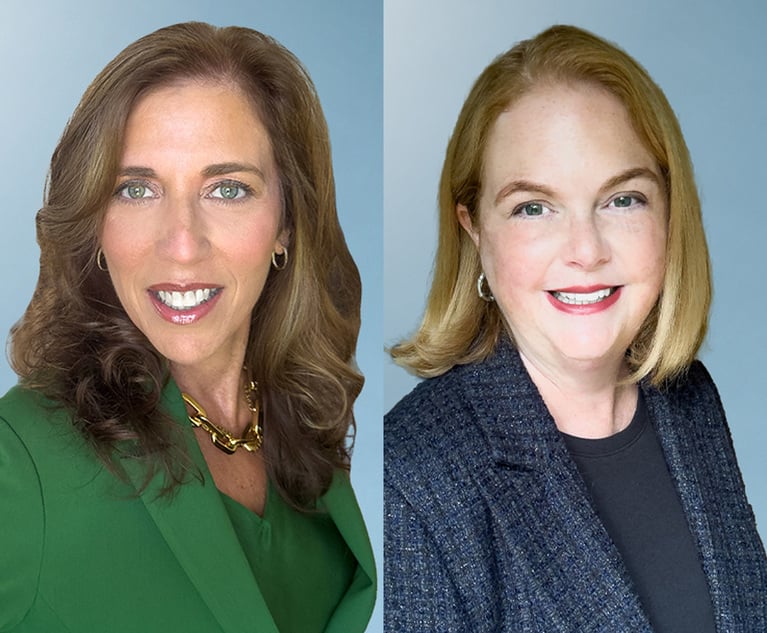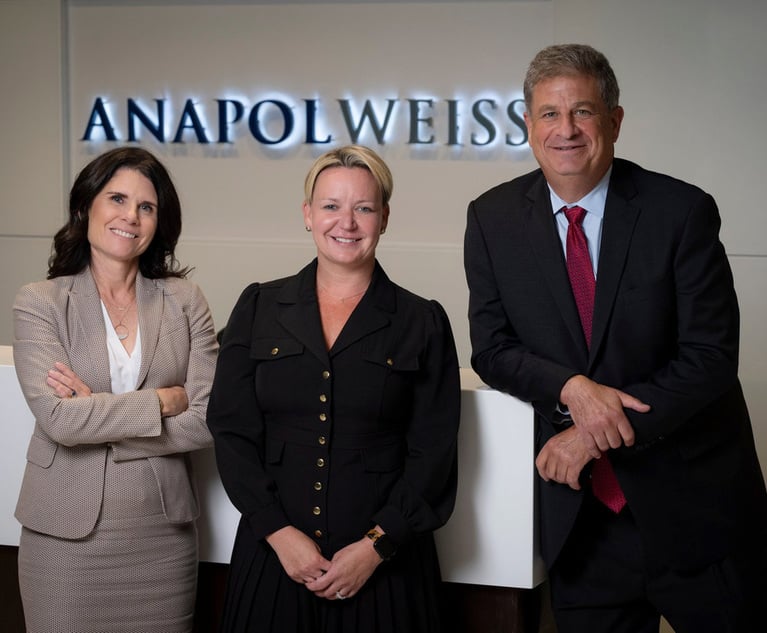Veteran Legal Recruiter Discusses Hiring Landscape for Female Lawyers
Natasha Innocenti is poised to receive an award for her efforts on behalf of women in Big Law. And she has some opinions about what law firms can do to better attract women lawyers.
March 16, 2018 at 07:52 PM
7 minute read
 Natasha Innocenti.
Natasha Innocenti. How has the recruiting landscape changed for female lawyers in the light of the #MeToo movement?
Natasha Innocenti, a longtime legal recruiter in the Bay Area, told The Recorder that most major changes in the legal profession occur incrementally, as female partners are still challenged by general discrimination issues in the industry.
As a vocal advocate for women in Big Law and elsewhere, Innocenti will be honored on March 21 in San Francisco by Legal Momentum, the oldest legal advocacy group for women in the country. The New York-based nonprofit, formerly known as the NOW Legal Defense and Education Fund, has bestowed Innocenti with its 2018 Women of Achievement Award, which honors women who achieve distinction in business, public service and law.
Over the last 22 years, Innocenti has placed more than 200 partners into Am Law 200 firms, with nearly half of her practice dedicated to representing female partners. She is now a partner at Mlegal Group Inc., which Innocenti joined last year after it absorbed her former recruiting firm, and she also co-founded the West chapter of Women in Law Empowerment Forum.
The Recorder caught up with Innocenti to chat about the current state of the legal industry.
You have been a legal recruiter for more than 20 years. What are some hiring trends or changes you have noticed lately?
One big change is that the diversity committee, the body within a law firm that is responsible for diversity initiatives, are now not just comprised of women and minorities. Increasingly I am seeing high-level men who are high-status partners within the firm getting more involved in diversity. I think that is driven by clients, particularly Fortune 100 companies, who are demanding more diversity. It has become a business issue for firms, as now you see companies actually measuring the diversity of the teams they hire. They are also giving out awards. For example, AT&T has a diversity award for the firm it uses with the best record of diversity. Pepsi and Oracle also track and reward law firm diversity. When a client sits down with the chairman of the firm and says, “You are not meeting with our diversity matrix,” you can believe that the firm is going to start doing a better job on diversity.
How has that changed for the female partners?
Women are less reluctant to advocate for their compensation and for business opportunities at law firms. When I started in this business, I would hear from some women partners, “Well, I couldn't possibly consider leaving my firm after they have made me a partner.” My response to them would be, “You made partner at your firm by earning it. That wasn't easy.” If you are happy with your firm, great, but that's not a reason not to consider an alternative, simply because they made you a partner out of the goodness of their heart. I promise you it was a business decision then and it is a business decision now.
Women are also being smarter about managing their careers. In part, because there is the gender gap in compensation. I think one of the reasons that average compensation for women partners is a little bit lower is that women historically haven't moved as often. When you have a robust lateral movement market, the market gets higher for the really competitive practice areas. And when you don't move, you artificially suppress that compensation.
Do you see more female partners now moving to other firms?
Anecdotally, I see that. I would say that's been true for over the last five to 10 years. Before that, there just weren't that many women moving. The gender gap is not only explained by lack of lateral movement, it is also explained by unexamined bias and male-dominated decision-making committees. We have always had a terrible problem of retaining women in law firms. It is a demanding profession and the expectation of partners in Big Law seems to continually increase.
One thing I would say is that the firms that have started to figure out how to be a better place for women are getting more women. So they're actually seizing on this opportunity to gain a competitive advantage with their clients and simply for their firm as a whole. When it comes to getting talent they have been able to demonstrate their commitment to hiring and retaining women partners. I think you'll see some winners and losers when it comes to diversity as it becomes more important to clients to have a diverse team.
What are some things a firm needs to do in order to become a better place for women?
I have a long list! Some things I think that have been helpful are universal parental leave as opposed to maternity leave, so that families of same-sex couples, foster parents and adopted parents are all able to take leave. That means it is no longer a gender issue. I have also seen some firms outsource, or provide a service, for shipping breast milk overnight. Another firm I know hires coaches to help women partners write their compensation memo or similar help for women associates writing partnership memos. Many firms will have you write a memo when negotiating compensation.
Sometimes women need some help advocating for themselves—women tend to undersell. I have known firms that have provided services like the new tech companies, such as laundry, dry cleaning and premade meals. The lawyers are paying for this in part, but it just makes life a little bit easier. It is a way of supporting people putting in the hours they are expected to put in, and also get to see their family. Law firms are being cannibalized by in-house departments as those departments continue to grow. We should be looking at Google and some of these other companies, which are enabling their employees to stay at work while getting their needs met. We need to get that kombucha bar going in law firms!
What's been the impact of the #MeToo movement on the recruiting landscape for female partners and law firms?
There are [a] couple ways #MeToo, in particular, is offering challenges and opportunities. One of the opportunities is firms have been putting together training and CLE programming around sexual harassment. It has made sexual harassment an important topic again, in a way that can be a business development opportunity for lawyers who are experts in that field. There is potentially an increasing number of clients interested in counseling and compliance to prevent sexual harassment from happening.
Law firms have been slower to address and prevent sexual harassment than some other organizations because they are partnerships, and partnerships have disaggregated decision-making. If a company has a corporate structure with a very clear chain of command, you can simply put in place policies, including a clear record when a claim of sexual harassment is made, conducting an investigation and following through appropriately.
Has the career path and opportunities for female lawyers in the Bay Area differed from what you've seen for women elsewhere?
One area where women's skills are underrepresented in the tech space is the emerging company practice. The source of business for a lot of the emerging company work starts with a venture capital fund. Venture capital is wildly male-dominated, and that trickles down. Those guys want to give their deals to their buddies. Their buddies are guys. So you have a practice area that has great strategic importance, is frankly very well-paid and where very few women are operating. A lot of the venture capitalists were startup people themselves who made a lot of money developing their companies, which means they were likely engineers originally.
So again, engineering is male-dominated. It's not surprising that engineering is male-dominated, tech is male-dominated, venture capital is male-dominated and the lawyers representing companies tend to be men. It's a challenge. It's not that the schedule is any more difficult. There is no other reason for women not to be well-represented in the emerging company practice area. It is a little bit of a boys' club.
Has that changed at all in the last couple of years?
I see an incremental increase, but not a game-changing increase.
All interviews are condensed and edited for style, grammar and clarity.
This content has been archived. It is available through our partners, LexisNexis® and Bloomberg Law.
To view this content, please continue to their sites.
Not a Lexis Subscriber?
Subscribe Now
Not a Bloomberg Law Subscriber?
Subscribe Now
NOT FOR REPRINT
© 2025 ALM Global, LLC, All Rights Reserved. Request academic re-use from www.copyright.com. All other uses, submit a request to [email protected]. For more information visit Asset & Logo Licensing.
You Might Like
View All
Once the LA Fires Are Extinguished, Expect the Litigation to Unfold for Years
5 minute read

Faegre Drinker Adds Three Former Federal Prosecutors From Greenberg Traurig
4 minute read
Anapol Weiss Acquires Boutique Led by Star Litigator Alexandra Walsh
5 minute readTrending Stories
Who Got The Work
J. Brugh Lower of Gibbons has entered an appearance for industrial equipment supplier Devco Corporation in a pending trademark infringement lawsuit. The suit, accusing the defendant of selling knock-off Graco products, was filed Dec. 18 in New Jersey District Court by Rivkin Radler on behalf of Graco Inc. and Graco Minnesota. The case, assigned to U.S. District Judge Zahid N. Quraishi, is 3:24-cv-11294, Graco Inc. et al v. Devco Corporation.
Who Got The Work
Rebecca Maller-Stein and Kent A. Yalowitz of Arnold & Porter Kaye Scholer have entered their appearances for Hanaco Venture Capital and its executives, Lior Prosor and David Frankel, in a pending securities lawsuit. The action, filed on Dec. 24 in New York Southern District Court by Zell, Aron & Co. on behalf of Goldeneye Advisors, accuses the defendants of negligently and fraudulently managing the plaintiff's $1 million investment. The case, assigned to U.S. District Judge Vernon S. Broderick, is 1:24-cv-09918, Goldeneye Advisors, LLC v. Hanaco Venture Capital, Ltd. et al.
Who Got The Work
Attorneys from A&O Shearman has stepped in as defense counsel for Toronto-Dominion Bank and other defendants in a pending securities class action. The suit, filed Dec. 11 in New York Southern District Court by Bleichmar Fonti & Auld, accuses the defendants of concealing the bank's 'pervasive' deficiencies in regards to its compliance with the Bank Secrecy Act and the quality of its anti-money laundering controls. The case, assigned to U.S. District Judge Arun Subramanian, is 1:24-cv-09445, Gonzalez v. The Toronto-Dominion Bank et al.
Who Got The Work
Crown Castle International, a Pennsylvania company providing shared communications infrastructure, has turned to Luke D. Wolf of Gordon Rees Scully Mansukhani to fend off a pending breach-of-contract lawsuit. The court action, filed Nov. 25 in Michigan Eastern District Court by Hooper Hathaway PC on behalf of The Town Residences LLC, accuses Crown Castle of failing to transfer approximately $30,000 in utility payments from T-Mobile in breach of a roof-top lease and assignment agreement. The case, assigned to U.S. District Judge Susan K. Declercq, is 2:24-cv-13131, The Town Residences LLC v. T-Mobile US, Inc. et al.
Who Got The Work
Wilfred P. Coronato and Daniel M. Schwartz of McCarter & English have stepped in as defense counsel to Electrolux Home Products Inc. in a pending product liability lawsuit. The court action, filed Nov. 26 in New York Eastern District Court by Poulos Lopiccolo PC and Nagel Rice LLP on behalf of David Stern, alleges that the defendant's refrigerators’ drawers and shelving repeatedly break and fall apart within months after purchase. The case, assigned to U.S. District Judge Joan M. Azrack, is 2:24-cv-08204, Stern v. Electrolux Home Products, Inc.
Featured Firms
Law Offices of Gary Martin Hays & Associates, P.C.
(470) 294-1674
Law Offices of Mark E. Salomone
(857) 444-6468
Smith & Hassler
(713) 739-1250






